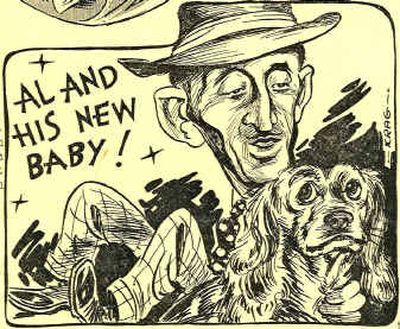Bronzed hat still brimming with Spokane lore

After a 58-year hiatus, Al Libby Jr. has returned to the newsroom.
Well, his hat is back, anyway. And that’s probably the best we can hope for, considering the hat’s owner died in 1946.
Libby was a star writer for The Spokesman-Review during the Roaring ‘20s, Depressed ‘30s and War-torn ‘40s.
When I say star, I mean star.
Libby busted stories wide open. He wrote a column. He covered the courthouse. He hobnobbed with the low and the mighty. He fought for the underdog.
Libby dreamed up crazy stunts and wrote about them.
Like when he ran off to join the circus as a calliope player. Crazy Ray, the circus virtuoso, wouldn’t let Libby touch the keys. But he did teach him how to fire up the boiler on the steam-powered instrument.
On another occasion Libby staged a one-man parade through downtown Spokane for an aging soldier from frontier battles with Indian tribes.
Once upon a time, every newspaper reader in these parts knew who Libby was.
Always nattily dressed, the wiry journalist was rarely seen in public without his trademark dark fedora affixed to his head.
Then Libby took his life on Nov. 5, 1946, at the age of 53.
Shocked and grieving members of the Spokane Press Club – which Libby helped found – had their pal’s hat bronzed and displayed on a wall in his honor. There it remained until the club folded in 1980.
As the decades passed, the world forgot about Libby.
I had never heard of him until a few days ago, when my pal Scott Cooper called. Cooper owns South Hill Hauling. He had come upon some newspaper-related mementos while being paid to clean out the estate of Jeanne Bennett. The former Spokesman-Review reporter died last May. She was 77.
Bennett was once president of the Press Club. When the organization closed, she apparently wound up with some of the memorabilia.
Among those items was that bronzed hat.
I knew I had to have it the second I laid eyes on it. Rumpled and dusty, the hat still has Libby’s age-yellowed Press Club card glued to the brim. It indicates that he had paid his dues through the last day of December 1946.
But Libby’s body was discovered almost two months earlier. He climbed into the attic of his home on West College and swallowed poison.
I became fascinated by the life and times of Albion C. Libby Jr. (his given name) after reading his file in the newspaper library.
A more complete picture of the man came by calling Dorothy Powers.
“He broke me in on the courthouse run,” said Powers, who began her own distinguished and long career at The Spokesman-Review in 1943. “He was so good to young reporters.”
Powers tells a story about covering a court case with Libby. To her astonishment she noticed that her mentor was not taking notes. Far from it. Libby, she said, was leaned back in his chair with his eyes half-closed.
Back in the newsroom, however, he banged out a story that was complete and accurate. “I’ve never known another reporter who could do that,” said Powers, who retired in 1988.
Libby wasn’t married. Unless you count his job, that is.
Covering the courthouse by day, he would remain at his desk well into the night, pounding the keys of his typewriter to file story after story for the newspaper’s many editions.
“He scooped the (Spokane Daily) Chronicle every day,” added Powers. “In every way he was a reporter’s reporter.”
After the final deadline, Libby could often be found at his favorite haunt: the poker table inside the Spokane Press Club. The Press Club was a popular downtown hangout back in the day and not just for journalists. Lawyers, judges, politicians… Power brokers of all stripes gravitated to the Press Club.
Libby was a Spokane kid. He graduated from Lewis and Clark High School and Washington State, which was only a “college” back then.
World War I took Libby to France and Belgium as a doughboy soldier. He served with the 91st Infantry Division, experiencing the brutality of war at its bloodiest.
Yet Libby preferred to recall his service with his tongue embedded firmly in his cheek:
“This writer went into the war as a private and came out with the same rank, holding his rank throughout nearly two years in the army, which is more than can be said of some corporals he knew.”
Libby covered the trial of Bluebeard, a psychopath who had murdered 13 wives and served a life sentence in California. He was nearly trampled by a trio of killers when they tried to bust out of the Spokane County Jail as he interviewed them.
He was one of a kind, that Al Libby.
The last 10 years of his life must have been hellish misery. Severe arthritis forced Libby to use a cane. Powers remembers that the man labored to sit down. “He could scarcely walk,” she said. Talking to him, however, “you would never have thought that he was hurting at all.”
Libby was an intensely private man who kept his troubles to himself.
The consensus after his death was that the pain got to be too much for him. That Libby chose to end his suffering. Powers agreed.
At The Spokesman-Review, the writer’s demise meant the end to a beloved institution known as Libby Day.
Each Wednesday, Libby would return from the courthouse confectioner’s stand with a box of chocolate bars that he would give away to his co-workers.
It’s amazing what things a guy learns when he ends up with an old bronzed hat.